
Polygraph tests, commonly known as lie detector tests, have long been a subject of intrigue, controversy, and legal debate. These tests are used to determine whether a person is being truthful or deceptive based on physiological responses to a series of questions. In the state of Michigan, polygraph tests play a unique role in both criminal investigations and employment procedures, yet their use is often misunderstood. This article delves into how polygraph tests work, their admissibility in Michigan courts, their use by employers, and the broader implications of relying on this technology.
How Polygraph Tests Work
A polygraph measures and records several physiological indicators such as blood pressure, pulse, respiration, and skin conductivity while the subject answers a structured series of questions. The theory is that when a person lies, they experience psychological stress that triggers involuntary physical reactions. A trained polygraph examiner interprets the results to determine whether these reactions suggest deception. However, it’s important to note that polygraph results are not foolproof. Emotional responses can vary widely between individuals, and external factors such as anxiety, medical conditions, or even caffeine consumption can affect the outcome. While the polygraph can sometimes help guide an investigation or prompt a confession, it is not scientifically infallible and should be understood as a tool rather than a final judgment.
Use of Polygraph Tests in Michigan’s Legal System
In Michigan, the use of polygraph tests in the courtroom is highly restricted. Unlike television portrayals where lie detector results are treated as definitive proof of guilt or innocence, Michigan courts generally do not allow polygraph results as admissible evidence. The Michigan Rules of Evidence deem polygraph test results inadmissible unless both parties involved in the case agree to admit the results beforehand, which is rare. Courts have historically viewed polygraph evidence as unreliable due to the potential for inaccurate readings and the subjective nature of interpreting the results. Despite this, polygraph tests are sometimes used during criminal investigations to assess suspects or witnesses and to shape the direction of questioning. Law enforcement agencies may use the polygraph as a tool, but it does not determine legal outcomes.
Employment and Polygraph Tests in Michigan
When it comes to employment, polygraph tests are subject to federal and state laws, particularly the Employee Polygraph Protection Act (EPPA). This federal law prohibits most private employers from using lie detector tests either for pre-employment screening or during employment. However, there are exceptions, especially for certain positions related to security services, government jobs, or roles involving controlled substances. In Michigan, employers must comply with these legal frameworks, and even in industries where polygraph testing is allowed, strict guidelines must be followed. Employees must be informed of their rights, and they cannot be forced to take a test as a condition of employment unless it falls under one of the lawful exceptions. Violations of these rules can result in legal consequences for employers.
Public Perception and Ethical Concerns
The use of polygraph tests continues to spark ethical debates. Supporters argue that polygraphs can be useful tools for narrowing down suspects, confirming suspicions, or deterring dishonest behavior. Critics, however, caution against overreliance on a method that lacks consistent scientific backing. False positives—where truthful individuals are judged deceptive—can have serious consequences, from wrongful job loss to damaged reputations or even wrongful arrests. There are also concerns about consent, privacy, and the pressure individuals may feel to agree to a test they don’t understand. As technology advances, discussions about the ethical use of lie detection tools are becoming increasingly important, especially as new forms of artificial intelligence and biometric data analysis enter the conversation.
Location in Michigan
Livonia – 38221 Plymouth Rd, Ste 2, Mailbox 11, Livonia, MI 48150
Conclusion
Polygraph tests remain a controversial but persistent tool in both the criminal justice and employment sectors in Michigan. While they can provide investigative leads or psychological insights, they are not definitive indicators of truth. In Michigan, their limited legal admissibility, especially in courtrooms, reflects the broader skepticism about their scientific reliability. For employers, strict regulations govern their use, ensuring that employees’ rights are protected. Ultimately, while the polygraph may have a place in certain investigative or professional settings, it should be approached with caution, awareness of its limitations, and a commitment to ethical standards.